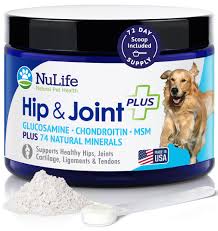Hip dysplasia is a genetic condition where the hip joint fails to develop properly, leading to arthritis and joint pain. While larger breeds like German Shepherds and Labrador Retrievers are more prone to hip dysplasia, it can affect dogs of all sizes. Common symptoms include stiffness, limping, difficulty standing, and a reluctance to engage in physical activity. Although veterinary treatments, such as surgery or medication, are often necessary for severe cases, many pet owners turn to natural supplements to support their dog’s joint health. Supplements for Hip Dysplasia in Dogs reduce inflammation, improve cartilage health, and provide comfort, making them an excellent addition to traditional treatments.
Why Use Supplements for Hip Dysplasia in Dogs?
Supplements offer a non-invasive way to manage hip dysplasia symptoms. While they won’t cure the condition, they can:
- Reduce Inflammation: Ingredients like omega-3 fatty acids and turmeric can help reduce joint inflammation and swelling.
- Support Cartilage Repair: Glucosamine and chondroitin are essential for rebuilding and maintaining healthy cartilage.
- Ease Pain: Natural anti-inflammatory agents provide pain relief without the side effects of conventional medications.
- Improve Mobility: Over time, supplements can help your dog move more comfortably and enjoy a better quality of life.
With these benefits in mind, let’s explore some of the best supplements available.
Top Supplements for Hip Dysplasia in Dogs
- Glucosamine and Chondroitin
These two compounds work synergistically to support cartilage health. Glucosamine helps repair damaged cartilage, while chondroitin prevents further breakdown. Dogs with hip dysplasia often experience relief from stiffness and improved joint function with consistent use. - Omega-3 Fatty Acids
Found in fish oil, omega-3 fatty acids have powerful anti-inflammatory properties. They can reduce joint swelling and improve overall mobility. Choose high-quality fish oil supplements to ensure your dog receives the maximum benefits. - MSM (Methylsulfonylmethane)
MSM is a natural sulfur compound that reduces inflammation and supports collagen production. It also helps alleviate joint pain, making it a great addition to a supplement regimen. - Turmeric and Curcumin
Turmeric, particularly its active compound curcumin, has natural anti-inflammatory properties. When combined with black pepper for enhanced absorption, turmeric can significantly reduce pain and improve your dog’s mobility. - Hyaluronic Acid
Hyaluronic acid supports joint lubrication, reducing friction and easing movement. It’s particularly helpful for dogs showing signs of stiffness or discomfort. - Green-Lipped Mussel
This nutrient-rich shellfish contains omega-3s, glucosamine, and chondroitin. It’s a powerful natural supplement for reducing inflammation and promoting joint repair.
How to Choose the Right Supplements
Not all supplements for hip dysplasia in dogs are created equal. Here are some tips to ensure you select the best option:
- Look for Quality Ingredients: Choose products with proven ingredients like glucosamine, chondroitin, and omega-3s.
- Check Dosage Guidelines: Ensure the supplement is formulated for your dog’s size and weight.
- Read Reviews: Look for testimonials from other pet owners to gauge the product’s effectiveness.
- Consult Your Vet: Always discuss new supplements with your veterinarian, especially if your dog is on medication or has other health concerns.
For more detailed guidance, visit trusted resources like Puppa Dogs.
Incorporating Supplements Into Your Dog’s Routine
Adding supplements to your dog’s daily routine doesn’t have to be challenging. Many products come in flavored chews, powders, or liquids that are easy to mix with food. Start with the recommended dosage and monitor your dog’s progress.
Pairing supplements with other strategies can further enhance their benefits. For example:
- Weight Management: Keeping your dog at a healthy weight reduces pressure on their joints.
- Gentle Exercise: Low-impact activities like swimming or short walks can help maintain muscle strength.
- Orthopedic Beds: Provide a comfortable resting place that supports their joints.
The Importance of Consistency
Supplements take time to show results. While some dogs may experience improvements within a few weeks, others might need several months. Consistency is key, so be patient and follow the recommended dosage.
Final Thoughts
Supplements for hip dysplasia in dogs offer a natural way to improve joint health and enhance your pet’s quality of life. By choosing the right nutrition plan, products and combining them with a healthy lifestyle particularly during winter, will provide your furry friend with the comfort they deserve.
For more tips on managing hip dysplasia, visit Puppa Dogs.
